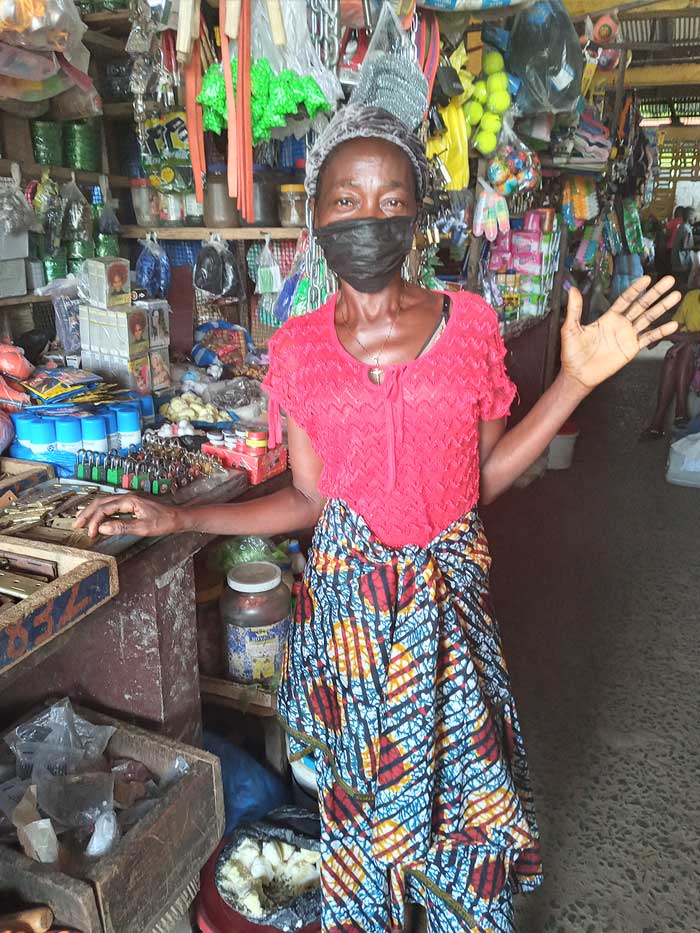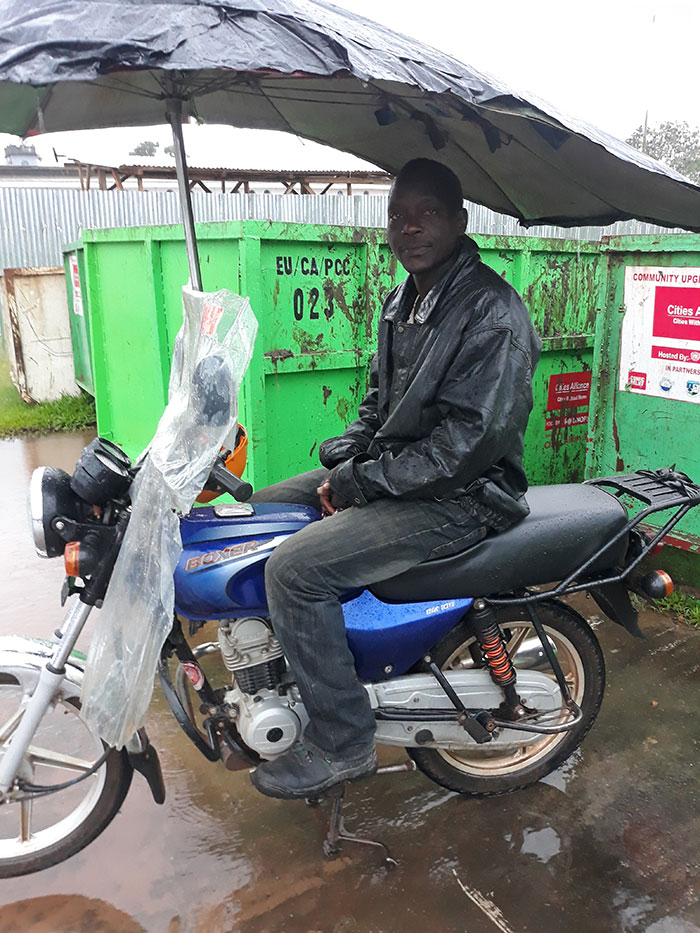Protecting a different kind of frontline worker in Liberia
Getting market women and pen-pen drivers vaccinated is critical to tackling COVID-19 in Liberia.
- 3 September 2021
- 5 min read
- by Patrice Juah

COVID-19 vaccine rollout began in Liberia on April 1. As vaccine awareness and rollout has increased in the country, a different kind of frontline worker has come into focus: female market sellers and ‘pen-pen’ drivers, who operate low-cost motorbike taxis. Both groups are critical to Liberian society, and have proven to be a collective force in the economy and politics. Now that strength is being harnessed to boost vaccine turnout.
Kumba Nyuma, a 46-year-old market seller at ELWA Market in Paynesville, took the AstraZeneca vaccine in July. The mother of three was one of the first in her market to get vaccinated.

“I took the vaccine because I know that it is good for my health. I want to be an example to other market women and show them that it is safe and can be trusted,” she says.
“With the Johnson & Johnson in country, we are expecting a higher uptake than what we’ve seen so far. This is a wakeup call to strengthen our messaging and enhance accessibility of health workers and the sites, so that the market women and pen-pen drivers can get there and take their vaccines on time.”
Kumba regards her decision as an investment beyond herself, and credits the experience with boosting her confidence and attitude towards her work. Numerous interactions with customers places market women at a higher risk of contracting the disease. Kumba believes that getting vaccinated has improved her ability to serve the public.
“I feel stronger and I worry less about my health and the safety of my customers. We (market women) are very important in Liberia. We feed households, provide basic goods and services, and are breadwinners for our families. Taking the vaccine puts me in a better position to do my work. To everyone, I say, move past fear and take the vaccine. It won’t harm you,” she adds.
With renewed hope, Kumba attributes her 15-year career to staying healthy and dedicated, even in the face of past challenges like the 2014 Ebola outbreak.
Both the Ministry of Health and the National Public Health Institute of Liberia have embarked upon outreach efforts to combat misinformation and increase awareness.
“We have had door to door engagements in various communities, with the help of community and youth leaders,” explains Felicia Gbesioh, Communications Director at the Ministry of Health.
Have you read?
“We initially encountered challenges with the street peddlers, market women and motorcyclists. Misinformation has impacted the numbers we need from those groups. However, with the support of our partners through our RCCE-CON (Risk Communication and Community Engagement) pillar, and our work with the Ministry of Information, NPHIL, and partners, we are on the right path. We continue to stress that the benefits of the vaccine outweigh the risks,”
This awareness appears to be improving uptake from the pen-pen drivers. Franklin P. Weah, a pen-pen driver and resident of Somalia Drive, recently took the Johnson & Johnson vaccine.
“I decided to take the vaccine because I know that it is helpful to society”, he says.

Franklin takes passengers across Monrovia and credits one of them for motivating him to get vaccinated.
“In my job, passengers’ safety comes first. In fact, it was one of them that encouraged me to get vaccinated”, he explains.
Aware of his colleagues’ reluctance to the vaccines, he adds “I regularly encourage pen-pen drivers to take the vaccine. Even when some respond negatively, I do not stop. All Liberians should get vaccinated like I did so that we can kick the virus out and move our country forward.”
In the face of challenges, Diana Sarteh, Deputy Chief Nursing Officer at the Ministry of Health, is looking on the bright side.
“When it comes to vaccine administration, the government is doing well. We’ve seen improvements in vaccine administration and willingness on the part of people to take the vaccine,” she notes.
To build upon this momentum, she stresses the need for an inclusive approach involving all citizens.
“We should all be ambassadors for vaccine awareness. Whether we’re talking in taxis, our homes, at church, at entertainment centres, we should be able to explain to each other the importance of this vaccine and its benefits,” she adds.
Jane MaCauley, Director General of the National Public Health Institute of Liberia, is hopeful that there will be increased uptake among the targeted groups and the general population, particularly now more vaccines are reaching the country.
“With the Johnson & Johnson (one-dose) vaccine, we are expecting a higher uptake than what we’ve seen so far. This is a wakeup call to strengthen our messaging and enhance accessibility of health workers and the sites, so that the market women and pen-pen drivers can get there and take their vaccines on time.”
Ms. MaCauley is confident that the combined efforts of the Ministry of Health, NPHIL and partners, backed by engagements with community leaders, heads of the market women and pen-pen associations, will boost trust in the process.
“With market people, if you say you’re going to do something, you have to do it. That way, they can trust you. To succeed with these groups, we must ensure that they have no doubts. They are a priority group; they’re in direct human-to-human contact, touching surfaces, handling food, and lifting loads. They are an at-risk population we’d like to see get vaccinated.”
More from Patrice Juah
Recommended for you





